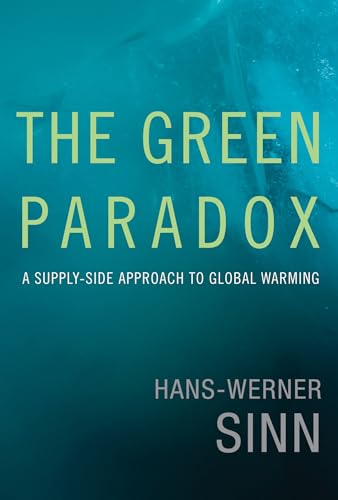Articoli correlati a The Green Paradox: A Supply-Side Approach to Global...

A leading economist develops a supply-side approach to fighting climate change that encourages resource owners to leave more of their fossil carbon underground.
The Earth is getting warmer. Yet, as Hans-Werner Sinn points out in this provocative book, the dominant policy approach—which aims to curb consumption of fossil energy—has been ineffective. Despite policy makers' efforts to promote alternative energy, impose emission controls on cars, and enforce tough energy-efficiency standards for buildings, the relentlessly rising curve of CO2 output does not show the slightest downward turn. Some proposed solutions are downright harmful: cultivating crops to make biofuels not only contributes to global warming but also uses resources that should be devoted to feeding the world's hungry. In The Green Paradox, Sinn proposes a new, more pragmatic approach based not on regulating the demand for fossil fuels but on controlling the supply.
The owners of carbon resources, Sinn explains, are pre-empting future regulation by accelerating the production of fossil energy while they can. This is the “Green Paradox”: expected future reduction in carbon consumption has the effect of accelerating climate change. Sinn suggests a supply-side solution: inducing the owners of carbon resources to leave more of their wealth underground. He proposes the swift introduction of a “Super-Kyoto” system—gathering all consumer countries into a cartel by means of a worldwide, coordinated cap-and-trade system supported by the levying of source taxes on capital income—to spoil the resource owners' appetite for financial assets.
Only if we can shift our focus from local demand to worldwide supply policies for reducing carbon emissions, Sinn argues, will we have a chance of staving off climate disaster.
Le informazioni nella sezione "Riassunto" possono far riferimento a edizioni diverse di questo titolo.
Hans-Werner Sinn is Professor of Economics and Public Finance at the University of Munich and President of the CESIfo Group. Author of Can Germany Be Saved? The Malaise of the World's First Welfare State (MIT Press) and other books, he is former president of the International Institute of Public Finance, and former chairman of the German Economic Association.
Le informazioni nella sezione "Su questo libro" possono far riferimento a edizioni diverse di questo titolo.
- EditoreThe MIT Press
- Data di pubblicazione2012
- ISBN 10 0262016680
- ISBN 13 9780262016681
- RilegaturaCopertina rigida
- Numero di pagine288
- Valutazione libreria
Compra nuovo
Scopri di più su questo articolo
Spese di spedizione:
EUR 3,73
In U.S.A.
I migliori risultati di ricerca su AbeBooks
The Green Paradox: A Supply-Side Approach to Global Warming (Mit Press)
Descrizione libro Hardcover. Condizione: new. New. Fast Shipping and good customer service. Codice articolo Holz_New_0262016680
The Green Paradox: A Supply-Side Approach to Global Warming (Mit Press)
Descrizione libro Hardcover. Condizione: new. New. Codice articolo Wizard0262016680
Green Paradox : A Supply-Side Approach to Global Warming
Descrizione libro Condizione: New. Codice articolo 14057420-n
The Green Paradox: A Supply-Side Approach to Global Warming (Mit Press)
Descrizione libro Hardcover. Condizione: new. New Copy. Customer Service Guaranteed. Codice articolo think0262016680
The Green Paradox: A Supply-Side Approach to Global Warming (Mit Press)
Descrizione libro Condizione: new. Codice articolo FrontCover0262016680
The Green Paradox
Descrizione libro hardback. Condizione: New. Language: ENG. Codice articolo 9780262016681
The Green Paradox A SupplySide Approach to Global Warming The MIT Press
Descrizione libro HRD. Condizione: New. New Book. Shipped from UK. Established seller since 2000. Codice articolo GB-9780262016681
The Green Paradox: A Supply-Side Approach to Global Warming (The MIT Press)
Descrizione libro Hardcover. Condizione: New. BRAND NEW ** SUPER FAST SHIPPING FROM UK WAREHOUSE ** 30 DAY MONEY BACK GUARANTEE. Codice articolo 9780262016681-GDR
The Green Paradox: A Supply-Side Approach to Global Warming (Mit Press)
Descrizione libro Condizione: New. In English. Codice articolo ria9780262016681_new
The Green Paradox: A Supply-Side Approach to Global Warming
Descrizione libro Hardback. Condizione: New. New copy - Usually dispatched within 4 working days. A leading economist develops a supply-side approach to fighting climate change that encourages resource owners to leave more of their fossil carbon underground. Codice articolo B9780262016681

